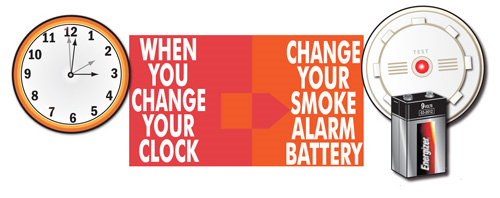Houston Fire Department
Change Your Clock, Change Your Battery

The Houston Fire Department (HFD) and Energizer Batteries team up to remind citizens to change the batteries in your smoke detector and carbon monoxide alarms when you reset your clocks as Daylight Saving Time ends and begins.
The HFD urges residents to make sure they have working smoke detectors in their home.
A fire doubles in size every 30 seconds. The sound of the alarm will give you and your family those few extra seconds to get out and stay out of your home. Checking your smoke detector and carbon monoxide alarm and changing the battery are one of the simplest things you can do to protect your family.
HFD statistics indicate that more than 30 percent of the home and apartment fires HFD responds to, do not have a working smoke detector or have no smoke detectors present. When smoke alarms fail to operate, it is usually because batteries are missing.
Smoke is usually what kills fire victims, not the fire, because the smoke puts you in a deeper sleep and without the sound of the smoke alarm, you succumb to the smoke as you breathe it in.
State law requires apartment owners to ensure that apartment units have working smoke detectors in them before they are occupied. Apartment residents are responsible for changing the batteries in those smoke detectors.
According to the Houston Apartment Association (HAA) more than one million Houstonians live in apartments. The HAA reminds residents to make sure their smoke detectors are working when they move into a new apartment. If there is any problem with the smoke detector, report it to management immediately.
The HFD also encourages everyone who has a carbon monoxide alarm to change the batteries in them as well.
Carbon monoxide is a colorless, odorless, tasteless gas that can kill you before you are even aware it is in your house. It causes side effects such as headaches, nausea, dizziness, disorientation and fatigue that are often mistaken for the flu. These effects can vary greatly from person to person depending on age, overall health and length of exposure.
The HFD recommends purchasing a carbon monoxide detector if you use gas or a fireplace for your heating; have your furnace professionally inspected every year and check for carbon monoxide emissions and install a carbon monoxide detector in the hallway near every separate sleeping area of the home.
When your carbon monoxide alarm sounds, ventilate the house with fresh air by opening windows and doors. Check your carbon monoxide detector by every month pressing the test button and replace the detector every 5 years.
The HFD also reminds citizens to have an evacuation plan in place so once you are alerted by the smoke detector; you know how to get out and stay out.
It's important that everyone not only have an escape plan, but that they know it and know where to meet if they should need to get out of their burning home.

